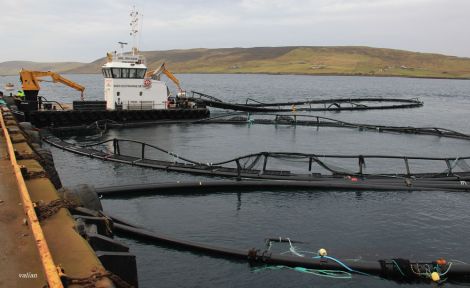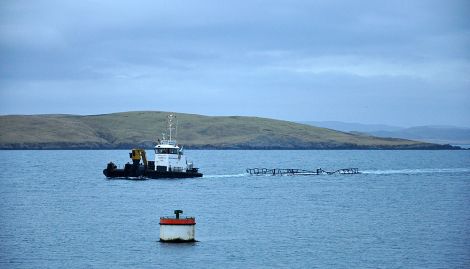News / Lessons will be learned from salmon cage loss
A FULL investigation is to be launched into how an entire Shetland salmon farm containing 300,000 fully grown fish was lost during the Christmas Day hurricane.
Government agency Marine Scotland, fish farm owners Meridian Salmon and the company’s insurers are to examine the circumstances that led to the first incident of its kind.
Twelve cages broke free from their moorings in 100mph gales off the isle of Uyea, south of Unst, and were washed out into the North Sea where they remained until earlier this week.
The effort to retrieve the cage hit many setbacks, with the cages being lost twice and the towline breaking three times.
Eventually the cages were separated and eight were successfully returned to Shetland, while the remaining four have sunk around 80 miles east of the isles.
Most of the fully grown salmon with an estimated market value of around £3 million are understood to have died, though some live fish may have escaped.
While Meridian management assess the damage with their insurers, Marine Scotland said on Wednesday that the incident would be discussed at the next meeting of the ministerial group on aquaculture’s improved containment working group to consider what action should be taken.
A spokesman said: “Lessons will be learnt that will lead to an increased state of preparedness in handling any future incidents and will feed into the development of the Scottish Technical Standard.
“It’s important to make a distinction between fish loss and fish escape. Over 300,000 adult Atlantic salmon were involved in the incident, but it remains unclear whether an escape of live farmed fish did occur or whether the fish died during the incident.”
He added that it would be “inappropriate” to comment on the exact circumstances that led to the loss of the cages until the investigation had concluded.
Become a member of Shetland News
“Whilst this particular incident is hugely disappointing, it has to be acknowledged that the vast majority of farms withstood the storms without incident. They also withstood the significant gales of late November 2011 and those in the previous spring,” he said.
The Scottish fish farming industry’s voluntary code of good practice recommends that “installations, facilities, moorings, pens and nets etc should be fit for purpose for the site conditions and installed by an appropriately qualified person”.
However, at present there is no defined standard for equipment and no robust audit process, also work on developing a draft standard is under way and is expected to be published early next month.
Become a member of Shetland News
Shetland News is asking its readers to consider paying for membership to get additional perks:
- Removal of third-party ads;
- Bookmark posts to read later;
- Exclusive curated weekly newsletter;
- Hide membership messages;
- Comments open for discussion.
If you appreciate what we do and feel strongly about impartial local journalism, then please become a member of Shetland News by either making a single payment, or setting up a monthly, quarterly or yearly subscription.





























































